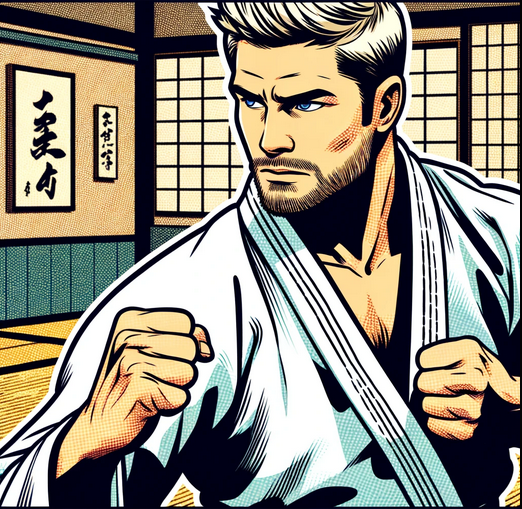
TLDR: Learning how to ask for a raise is an ancient art that any Chad should strive to master. Just like ninjas carried out point perfect missions with chilling precision, so should be your calculated professional moves. Learn how to prepare, what to say, and how to cultivate a positive outlook on your professional life.
⛩️ Welcome to the Dojo
🥋 First Dogma: Think More of Yourself
🦵 Second Dogma: Leverage your Value
⚡ Third Dogma: Be Proactive
🥷 Entering the Arena
😎 The Chad Takeaway
⛩️ WELCOME TO THE DOJO
Let’s start on a high note.
It’s likely that you’re worth more than what your current paycheck suggests.
In fact, companies usually bank on their employees settling for less. It’s like the secret menu at a ramen izakaya – most don’t know it exists, but once you do, oh boy, it’s a game-changer!
Payroll pundits agree that job hoppers – those who switch jobs with the frequency a renegade ronin changed allegiance– tend to score fatter paychecks than the loyal samurai who sticks around.
Red flag? Maybe.
But it also paints a clear picture: If you’re a dedicated, long-term player, it’s time to master the ancient and noble art of Raise-Kwon-Do.
Why Raise-Kwon-Do, you ask? Because you need to follow this dojo’s dogmas.
Don’t ask, claim.
Don’t expect an all benevolent paycheck upgrade to just fall in your lap. Earn it.
🥋 FIRST DOGMA: THINK MORE OF YOURSELF
In the world of Raise-Kwon-Do, self-belief is your black belt.
Never underestimate your value. It’s like going to the gym – the more you flex your ambition, the stronger it gets.
Regularly assess your skills, achievements, and market value. Check job boards for similar jobs and how much are they paying.
Keep a victory log – note every win, no matter how small. Note how you contributed to it.
Build a strong pile of evidence for your case. Remember, if you don’t believe in your worth, why should your boss?

🦵 SECOND DOGMA: LEVERAGE YOUR VALUE
Just to be clear, you’re not threatening to walk out; you’re highlighting your indispensability.
The more you can good-heartedly and subtly show your employer how much value would be lost if suddenly you were to disappear, the more leverage you have for a negotiation later on.
⚡ THIRD DOGMA: BE PROACTIVE
Great workers usually go unnoticed. There’s an ancient saying that, great work whispers, while mistakes scream.
Maybe your superior is already accustomed to you being a well-oiled machine, it is quite possible that your outstanding work gets dubbed as just the standard.
No one is going to just hand you a random raise.
Don’t wait to be recognized. Use every possible check-ins with your boss to discuss your progress and goals.

🥷 ENTERING THE ARENA
So now you’ve mastered those dogmas and already inked them as tattoos on your arms. You might feel ready to do the heist.
Break into the castle, talk to the shogun (your boss) and get away with the prize. All with the swiftness and elegance of a ninja.
Not so fast. Any decent Raise-Kwon-Do ninja should have these tips at hand.
Have Clarity About Your Worth:
Before you enter the negotiation arena, you must know your number. This isn’t a random figure on a kaiga painting; it’s a value backed by research and your track record. If you can quantify the benefits of your achievements, do it. Be ready to articulate clearly why you deserve this raise. Don’t suggest, state.
Master the Art of Timing
Any good warrior knows the prudency of choosing the right moment to attack.
Hard times? Wait for the dust to settle, then make your move.
Times of financial bonanza? Guard may be down, might be time to plunge in.
Finding yourself in a favorable ground, like having some new responsibilities? Don’t waste that advantage, and use it for leverage.
Look Beyond the Money:
Sometimes the best deals aren’t just about cold, hard cash. Be open for other forms of compensation. More vacation time, flexible working hours, professional development opportunities, or even a better title. These perks not only sweeten the deal but can also enhance your work-life balance and career trajectory.
Avoid Comparisons:
The greatest swordmen in history knew that some missions were supposed to be undertaken alone. Avoid comparing yourself to your colleagues. Focus on your unique contributions and value to the company. It’s about what you bring to the table, not how you compare to others.
Handling Rejection:
If you get a ‘no’, don’t see it as a full stop; it’s just a line break in your haiku. Ask for specific feedback. What can you improve? What goals should you aim for? Show resilience and commitment to growth. Once you fixed whatever you could fix, return and ask again.

😎 THE CHAD TAKEAWAY
Of course, this is just the first of many lessons one could learn in the sacred Raise-Kwon-Do dojo.
Just remember that thinking that you deserve a raise is already the first step moving forward, but treat it like the venturous mission it is. Have a strategy, a plan, and the weapons to properly execute it.

